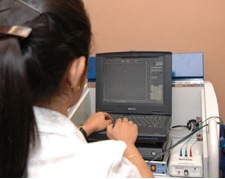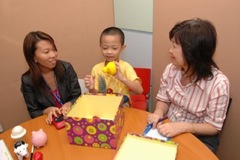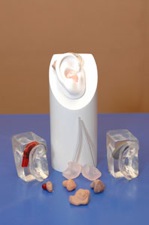Every hearing-impaired child should have a comprehensive hearing test and early intervention to ensure integration into mainstream society.
Audiological Evaluation
- Acoustic Reflex Threshold
- Acoustic Reflex Decay
- Auditory Brainstem Response (ABR)
- Central Auditory Processing Disorder (CAPD)
- Cochlear Implant Evaluation
- Eustachian Tube Function Test
- Hearing Aid Fitting
- Hearing Screening
- Otoacoustic Emissions (OAE's)
- Play Audiometry
- Pure Tone Audiometry
- Speech Audiometry
- Steady State Evoked Potential (SSEP)
- Tympanometry
- Visual Reinforcement Audiometry (VRA)

Audiological Evaluation
- Hearing Screening
- Pure Tone Audiometry
- Tympanometry
- Eustachian Tube Function Test
- Otoacoustic Emissions (OAE's)
- Visual Reinforcement Audiometry (VRA)
- Acoustic Reflex Threshold
- Acoustic Reflex Decay
- Central Auditory Processing Disorder (CAPD)
- Speech Test
- Tone Decay
- Auditory Brainstem Response (ABR)
- Steady State Evoked Potential (SSEP)
Universal Newborn Hearing Screening Programme
Hearing loss is the most common congenital disorder. The Department of Neonatology, NUH, initiated the screening programme in 1999. Initially, the tests targeted only high-risk infants, but this approach identified only about 50% of affected children. The failure to identify all cases led to late diagnosis and interventions, which were delayed. As a result, the Universal Newborn Hearing Screening programme (UNHS) has become an important component of standard medical care. This programme is run in collaboration with the ENT department. With a national UNHS programme in place since April 2002, more hearing-impaired children in Singapore are now expected to successfully integrate into mainstream education.
A study in Singapore from June 2002 to May 2003 highlighted the need for early detection and intervention. The incidence of hearing loss was found to be 5.2 per 1000 newborns, with severe to profound impairment occurring in 3 per 1000.
The aim of the UNHS programme is to diagnose and intervene early, allowing children to develop normal speech and language, thereby reducing communication disabilities. This early intervention also aims to foster positive academic outcomes and normal social development, enhancing the opportunities for hearing-impaired children to integrate into the hearing world from infancy and receive formal education alongside their hearing peers.
For most children with significant hearing loss, the preferred method of intervention may be amplification, accompanied by appropriate counselling and habilitative therapy.

Auditory Verbal Therapy
Aural habilitation focuses on maximising the auditory function of individuals with hearing impairments to facilitate listening and spoken language acquisition. It is highly recommended for all children diagnosed with hearing loss, as the development of listening and speaking skills is not automatic following the fitting of hearing aids or cochlear implantation.
Therapy sessions are conducted weekly, or as recommended by our therapists. The caregiver attends each session with the child and learns various techniques to encourage the child to listen, react, respond and subsequently comprehend. The goal of each session is to equip caregivers with the skills necessary for daily interaction with the child. Sessions are tailored to the child's needs and typically involve play activities, including singing and reading. These activities aim to develop listening, language comprehension, language expression, speech, cognition and social, in accordance to the child's needs. These strategies are then shared with parents for continued application during play at home. The ultimate goal is to integrate each child, as fully as possible, into our listening society.
We work closely with caregivers and family members to ensure that the child's home environment supports an auditory-verbal lifestyle. Our aim is to provide families with the necessary education, guidance, advocacy and support. Regular home and school visits are conducted to monitor the child's integration into the listening world. We also maintain close contact with teachers, principals and other school staff. This therapy is also suitable for adults who have experienced hearing loss since childhood wish to improve their listening and speaking skills after being fitted with current amplification devices (hearing aids or cochlear implants) as recommended by doctors and audiologists.
For further information on our Auditory Verbal Therapy service, please contact: Tel: 6772 4477
Treatment Options
Cochlear Implant (CI) Progamme
The Cochlear Implant (CI) programme, integral to the Centre for Hearing Intervention and Language Development (CHILD) at NUH, conducts assessments to determine if hearing-impaired children or adults are viable candidates for CI surgery. This programme encompasses the surgical procedure and coordinates the post-operative services for these patients.
Prospective patients interested in the CI programme are encouraged to provide relevant information regarding their or their child's medical and hearing history for evaluation and candidate selection. Based on the information submitted, they may then be recommended for a more comprehensive assessment, such as the Auditory Performance Evaluation (APE).
A qualified audiologist and therapist will conduct specific speech and language assessments as required and oversee post-implant habilitation.
Cochlear Implant Investigations and Therapy
- MAPping
- Neural Response Telemetry (NRT)
- Auditory Performance Evaluation (APE)
- Auditory Verbal Therapy (AVT)
To qualify as a candidate for a cochlear implant, families are required to participate in recommended assessments before a final evaluation is made. They must also be committed to the clinic's approach. All individuals receiving implants must undergo regular post-operative assessments.
Common FAQs on Cochlear Implant Surgery
- What is the surgery about?
Before a cochlear implant is considered, a series of tests such as ear examination, hearing evaluation, radiologic (X-ray, MRI) examination and AVT are necessary.
Performed by an Otolaryngologist (ENT Specialist) under general anaesthesia, cochlear implant surgery typically lasts between two to three hours. An incision is made behind the ear to access the mastoid cavity that leads to the middle and inner ears. Post-surgery, an X-ray confirms the implant's placement. Generally, patients stay in the hospital for one or two days following the procedure.
- What happens after the surgery?
About one month after surgery, the cochlear implant team activates the implant and instructs parents on system care. Follow-up visits for regular check-ups and speech processor adjustments are to be expected.
- What can I expect from the surgery?
Cochlear implants do not restore normal hearing and the outcomes may vary between individuals. Factors influencing the extent of benefit from a cochlear implant include:- The duration the patient had been deaf.
- The number of intact auditory nerve fibers.
- The motivation of the patient and their family to engage in the auditory and speech learning process.
Cochlear Implant Surgery

Hearing Aids
Digital, programmable and multi-channel behind-the-ear (BTE) hearing aids cater to a range of hearing losses from mild to profound. Various custom models, such as Completely-In-The-Canal (CIC), In-The-Canal (ITC) and In-The-Ear (ITE), utilise the natural ear shape to enhance hearing. These devices are designed to be unobtrusive and aesthetically pleasing.
At CHILD, our audiologists provide a wide range of hearing aids and services. We offer tailored fitting for all invididuals of all ages and degrees of hearing loss.
Services




















